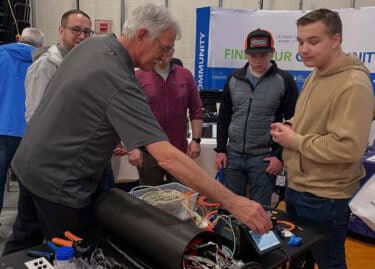Community College System of NH Reduces Cost of Classroom Materials for Students
Implementation of Open Educational Resources looks to save $500,000 in costs to students
A new initiative that encourages faculty members to use more Open Educational Resources (OER) to help bring down the cost of education across the Community College System of New Hampshire (CCSNH) is gaining momentum. Launched in the summer of 2018, the initiative involves an initial pilot group of 15 faculty members working to convert their courses to OER. Due to the success of this pilot, the program will be expanded for 2019-20 and has the potential of saving students upwards of $500,000 over the coming academic year.
According to the Hewlett Foundation, Open Educational Resources are defined as instructional materials that are fully accessible and reside in the public domain or have been released under an intellectual property license that permits their free use and re-purposing by others. OER includes full courses, course materials, modules, textbooks, streaming videos, tests, software and any other tools, materials or techniques used to support access to knowledge.
Last summer, CCSNH awarded grants to faculty interested in developing OER materials for courses at colleges across the community college system in biology, college composition, algebra and the humanities. Based on this initial work, CCSNH believes that the wider implementation of OER and other free or reduced-cost textbook options will serve over 3,800 CCSNH students at all seven colleges in the new academic year, saving students a conservative projection of $465,000 in textbook expenses.
“Nationally, OER has proven to be a good student success initiative that lowers costs while creating first-day access to course materials. We understand that cost is a significant barrier to education for many New Hampshire students and we are always looking for ways to reduce cost. The OER model can provide students with ongoing access to faculty-customized content, which not only saves them money, it helps set them up for greater success in the classroom and in their careers. We see great potential for all CCSNH students,” said Jennifer Cournoyer, vice president of academic and student affairs at River Valley Community College. Cournoyer has been spearheading this initiative for CCSNH based on past experience with OER.
For the coming academic year, a task force has been created with the purpose of creating a support structure that colleges can use to support faculty interested in developing OER resources for courses they teach. All seven of NH’s community colleges are participating. Instructors can customize OER to align with their coursework, and can make materials available on line at no cost, with the option to print them out as needed.
OER adoption is occurring at the regional and national level. CCSNH has joined a multi-state collaborative and will be working with the University System of New Hampshire (USNH), the University System of Maryland (USM), City University of New York (CUNY), and State University of New York (SUNY) to bring more awareness of the value and cost-savings of OER. As part of this process, all course materials are open source and can be accessed by participating faculty. As a result, materials can be more closely aligned with the curriculum because they are customized. In addition, there is a review and rating function associated with OER materials for faculty to ensure they are relevant and high quality.
This three-state collaborative will work together on larger OER initiatives and will support CCSNH’s collaborative work with USNH on statewide projects. Robin DeRosa, a national leader in OER adoption and a faculty member at Plymouth State University, has played a key role integrating these efforts for a more seamless and efficient rollout.
To learn more, contact Meghan Eckner at [email protected] or 603-230-3506.



